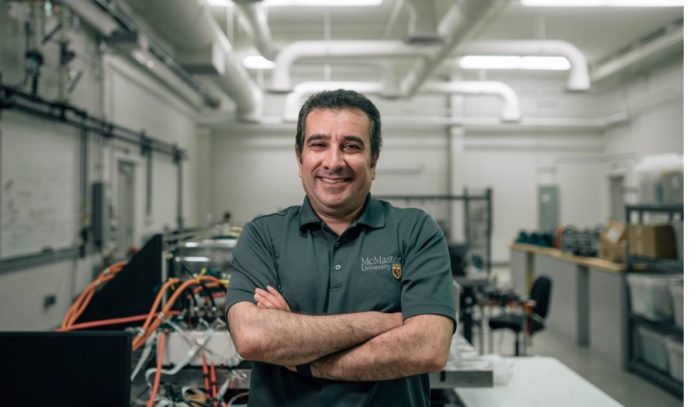Hamilton is “Electric City” once again, thanks to the cutting-edge work of a research team at McMaster University that is powering the path to next-generation mobility.
Dr. Ali Emadi’s research group – the Canada Excellence Research Chair (CERC) Laureate Program at McMaster Automotive Resource Centre (MARC) – in Hamilton is one of the world’s leading academic research programs in transportation electrification and smart mobility with more than 250 graduate and undergraduate students, post-doctoral research fellows, and engineers.
MARC is a 90,000-square-foot purpose-built facility at McMaster Innovation Park where researchers work directly with industry to develop and test new technologies.
“Our model at MARC is to go big and go deep with industry partnerships. Our strategic alliances with the sector mean we are embedded with them right from the beginning of design,” said Emadi, who is a professor of electrical and computer engineering and mechanical engineering.
“We also have one of the best testing environments in the world. We can test electric motors, battery cells and packs, entire powertrains and entire vehicles.”
Emadi’s group works with companies of all sizes, from Ontario’s largest automotive manufacturer Stellantis (formerly Fiat Chrysler Automobiles), Ford, and GM to small, medium and start-up enterprises.
PhD and master’s graduates from Emadi’s team are in high demand all around the world.
“If we graduated 400 more of them today, they would all have jobs yesterday. There is an unbelievable need out there for talent and companies are investing where they know that expertise is centred,” said Emadi.
“Ontario is training engineers at a much higher rate than many other jurisdictions in North America and companies are realizing that. With government support, there is a tremendous opportunity to land more automotive investment in Ontario.”
Emadi, whose long list of academic, industry and investment achievements has established him as one of the leaders in his field, believes Ontario can be at the forefront of production of next-generation electric powertrains for automotive, industrial, consumer and micro-mobility sectors.
“The province has a massive advantage in intellectual property, expertise, testing, manufacturing capacity and talent generation in this field. There is a monumental opportunity at hand. MARC is an anchor of all of that.”
Emadi has created four spin-off companies out of his work, including two at McMaster University: Enedym, which is developing electric motors for a range of industries; and Menlolab, which is creating software tools for the design of electric and autonomous cars.
More than 15 million electric motors are manufactured worldwide every day, powering everything from household appliances to industrial and agricultural equipment to e-bikes, e-scooters and electrified vehicles of all shapes and sizes.
So while the market is huge and the need to transition away from internal combustion engines is immediate, a long-standing challenge is the cost of producing motors that require rare earth metals in permanent magnets. That can account for 30 to 40 per cent of the cost of the motor.
Enedym’s patented disruptive technology removes the need for the magnets, substantially reducing the cost, while providing powerful, efficient and high-performance operation.
The company, which is partially owned by McMaster, holds more than 50 patents or patents pending.
Enedym, which currently employs 35 people, is on a trajectory of rapid growth after attracting international strategic investors and licensing deals in 2021.
Other research groups at MARC include the Centre for Automotive Materials and Corrosion, the Centre for Mechatronics and Hybrid Technology and the McMaster Centre for Software Certification (McSCert). Soon, the McMaster Manufacturing Research Institute will move to the MARC facility to further amplify collaboration.
In June 2021, the university received $10 million from FedDev Ontario to support an integrated automotive, aerospace, and advanced manufacturing electrification network known as iHub that leverages another $16.8 million from industry partners.
When Emadi was offered a $10-million Canada Excellence Research Chair in Hybrid Powertrain at McMaster in 2011, he says what really sold him was Hamilton’s history as Electric City. It was one of the first cities on the continent to be electrified by hydro power in 1898 thanks to the transmission technology of Nikola Tesla. That shaped the city’s industrial legacy, including all the powerful innovation of Westinghouse on the very site where MARC stands today.
Says Emadi: “Hamilton is the home of manufacturing and electricity and we believe electrification can transform Hamilton a second time.”
















